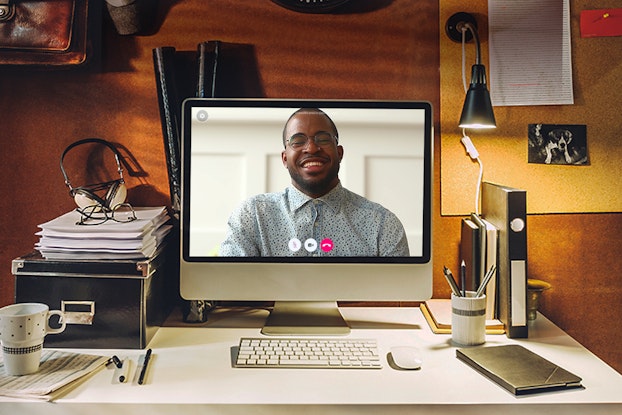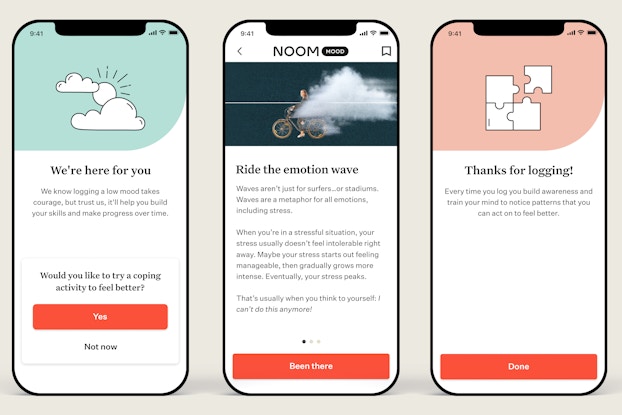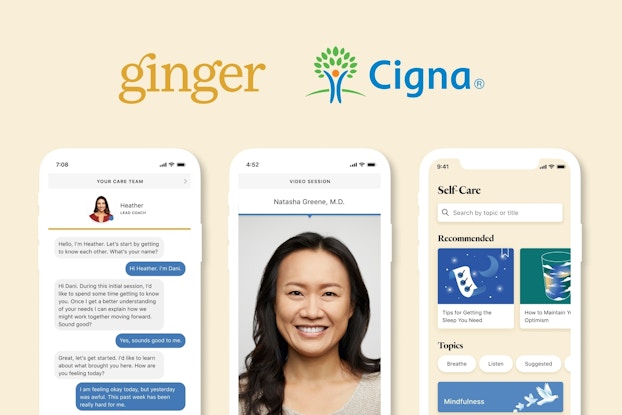
Why it matters:
- Stress, anxiety and mental health issues have become a growing concern of American workers and the businesses that employ them.
- Forty percent of workers say they plan to change jobs due to mental health concerns.
- Workers increasingly expect employers to offer benefit packages that include easy-to-access mental health services — so telehealth disruptors Headspace Health, Talkspace and Noom are delivering just that to grow business.
A recent American Psychological Association survey found that more than a third of employees said mental health problems prevented them from performing effectively at work. Three out of five workers said they experienced work-related stress, and two out of five said they plan to change jobs, largely due to stress.
The pandemic has left American workers feeling mentally exhausted. Labor shortages and the Great Resignation have awakened employers to the need to provide mental health support as a way to retain and motivate workers.

Interested in a small business membership?
Find out how the U.S. Chamber of Commerce can help your company grow and thrive in today's rapidly-evolving business environment. Connect with our team to learn how a small business membership can benefit your bottom line and help you achieve your goals.
Wellness brands Talkspace, Noom and Headspace Health are among the companies looking to meet this increased demand with employer-backed mental health support programs. Executives from those brands spoke with CO— about the growth opportunities they see in 2022.
Businesses have to think about, ‘How do we support our workforce?’ Because if 40% of your workforce is facing burnout and 50% are thinking of leaving a job because of mental health issues, a company can’t operate like that.
Russ Glass, CEO, Headspace Health
Talkspace: Targeting high-stress industries
One of the silver linings of the pandemic, Erin Boyd, Chief Growth Officer of Talkspace, told CO—, is that it increased awareness of mental health needs. “It did more to reduce the stigma around receiving behavioral mental health care in two months” than had occurred over the previous 20 years, she said.
Talkspace, an online therapy provider based in New York, was founded in 2012 to offer individuals access to therapy via text messaging and video appointments. It became a public company in mid-2021, and it is focusing its 2022 growth strategy on partnering with business and health care plans to make its services available to employees.
“We started out in 2021 with about 50 employer groups contracting directly with us, and at the end of 2021 we had about 150, with the fourth quarter being our biggest growth quarter ever,” Boyd said.
The company reported that revenue surged 49% in 2021 over the previous year, driven primarily by gains in its business accounts. Over 69 million people are eligible for Talkspace services as a result of business and insurer partnerships, and the company expects to add several major insurer and business clients this year.
To support this growth, Talkspace has increased its business-to-business sales team and is targeting industries like health care, hospitality and education, where stress and mental health needs have become particularly acute during the pandemic.
Employers who contract directly with Talkspace, rather than providing services through their health plan, pay based on number of employees. Talkspace has found that a higher percentage of employees at small businesses take advantage of the services, Boyd said.
“When a small employer offers this, their employees are saying, ‘Yes, I need this, thank you,’ and they are using it,” she said.
When employers make Talkspace available, it tells employees that “your mental health is as important to us as your physical health,” Boyd said.
“In the next couple of years, there is going to be an employee expectation that there is a behavioral mental health component to their wellness packages.”
[Read: Talkspace President on Therapy App's Explosive Pandemic Growth: 'It Was a Pivotal Moment']

Noom: Shifting focus from food to mood
Noom, the digital app launched in 2008 as a weight management tool, is now using the artificial intelligence and motivational tools honed to help users lose weight to position itself as a broader behavioral health provider.
Last fall, Noom launched Noom Mood, a program designed to help people develop habits to manage stress and anxiety.
In 2019 Noom surveyed the users of its weight management app, asking what other services they were interested in receiving.
“Two-thirds of our users answered they wanted to learn more about how to manage stress and anxiety,” Noom co-founder and CEO Saeju Jeong told CO—.
“A lot of users reacted very strongly – saying yes, stress and anxiety are why I can’t build a healthy habit, or the root cause of why I crave a bad food,” Jeong said.
Noom responded by putting behavioral tools used by therapists and psychologists to manage anxiety and stress into a mobile platform that lets users monitor their progress and learn what works best for them.
Users can receive one-on-one coaching, set goals and log their daily moods. The platform also provides daily lessons on how to cope with stress and anxiety.
Noom users can add Noom Mood for an additional fee.
Noom doesn’t reveal how many users have downloaded its apps, but as of 2021, the company logged $400 million in sales.
The company aims to expand beyond its large base of individual consumers to become a health care benefit offered widely by employers. “Employers now care more than ever about helping their workers manage stress,” Jeong said.
“Employers are eager to have a preventative way of helping employees before their important talent hits the wall and becomes burned out, depressed,” he said. “Why would they not provide a service that can actually build the mental muscle stronger, so they can prevent more costly care?”
Becoming an employer or health plan provided benefit “is a huge business opportunity” for us, Jeong said.
[Read: How Noom Tapped Psychology and Technology to Build a $400 Million Weight-Loss App]
Because Noom is a brand that’s now well known and trusted by consumers, it can be used to encourage more workers to sign up for Noom Mood when it’s included in a package of behavioral health management services, he said.

Headspace Health: merging mental health services and meditation
Headspace, the company behind the popular meditation app launched in 2012, last year merged with text and video therapy platform Ginger to form Headspace Health, in a deal that valued the combined company at $3 billion.
Headspace Health was created because of the growing need for mental health services in the workplace, CEO Russ Glass told CO—.
“This has become a business continuity issue,” he said. “Businesses have to think about, ‘How do we support our workforce?’ Because if 40% of your workforce is facing burnout and 50% are thinking of leaving a job because of mental health issues, a company can’t operate like that.”
Ginger was founded in 2011 by a group of entrepreneurs and MIT data scientists. It grew from a smartphone app that could identify patterns of stress, anxiety and depression, and alert health care providers to a platform that delivered round-the-clock, on-demand mental health care via a network of practitioners.
The combined company now is working with over 3,500 businesses and health care plans around the world to provide mental health services.
The merger, Glass said, combines the strengths of Headspace, which has been downloaded over 70 million times, and is beloved by its users, with Ginger, which has the network needed to connect users by text with a behavioral coach within two minutes, or refer them for higher levels of care.
The popularity of Headspace will fuel growth, he said, by leading to greater use of the teletherapy and coaching services by eligible employees.
Ginger typically had to conduct a lot of education and outreach to get employees to sign up for its services when a business added them to its benefits plan. “You really had to work hard to get even in the low teens of adoption,” he said.
“Headspace gets 30%-plus signups, just because so many people know what Headspace is,” he said.
Headspace also helps to get employees thinking about their mental health earlier, he said. “It creates a stigma-free, fun, easy-to-use way to take care of your brain, five minutes a day, 10 minutes a day, to make sure you’re not going to run into mental health issues down the road.”
In addition to the growth opportunities the merger creates to add business clients and platform users, Glass plans to drive growth by adding more products for teenagers.
“If you look at the work force, one of the big issues that workers are facing is that their teenagers at home are really suffering,” Glass said. That makes it hard for the parents to focus on work and adds to their stress and anxiety.
“So, supporting those dependents is really supporting the parents who are working,” he said.
-Barbara Thau contributed to this story.
CO— aims to bring you inspiration from leading respected experts. However, before making any business decision, you should consult a professional who can advise you based on your individual situation.
Follow us on Instagram for more expert tips & business owners’ stories.
CO—is committed to helping you start, run and grow your small business. Learn more about the benefits of small business membership in the U.S. Chamber of Commerce, here.







